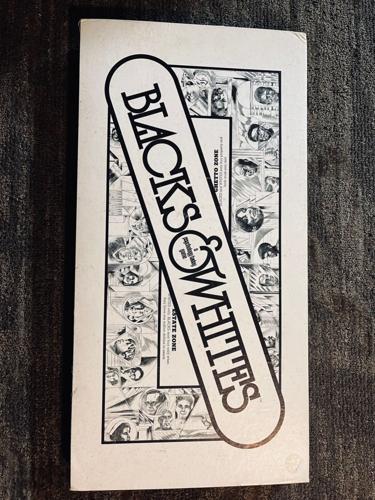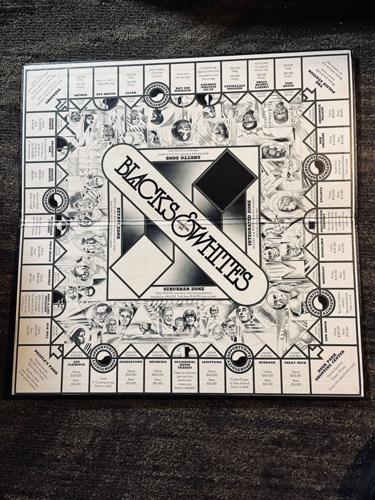Several weeks ago, I was thinking about board games that I played in the past. The game of checkers was one of those popular games. In my neighborhood, its popularity could be observed in men seated on crates, in empty lots and street corners, playing this game. Scrabble, along with Risk, Backgammon, and The Game of Life are other games that many played in the past. Even if you did not play these games or have never heard of them, I have no doubt that you know all about Monopoly. As I thought about these board games, my mind went to a board game in my personal Black memorabilia collection that I am sharing with you today. This game, born out of the civil rights movement, is a clever and interesting game that mimics race relations as we have known them over the years remains relevant today. So, let me introduce the game, “Blacks & Whites,” a board game created in 1970, not that far, back in the day.
The original Blacks & Whites board game began as a free game insert in the March 1970 issue of Psychology Today magazine. This insert included a paper board and uncounted cards that had to be cut out.
About the same time, the company issued a boxed version of the game, with better components and play money. The game was developed at the University of California at Davis by Psychology Department Chairman Professor Robert Sommer and Judy Tart.
The game was subsequently modified by students that tested it for Psychology Today. It was viewed as a painless way for middle-class whites to experience and understand the frustrations of Blacks. Interestingly, when the game was originally created, it was designed so that Blacks could not win.
The game was redesigned by David Popoff, a Psychology Today editor who took suggestions from militant Blacks in San Diego. These suggestions lead to new rules and even included an opportunity for Blacks to beat the system.
On the bottom of the box, as is the case with the one in my collection, the game description reads: “Experience the ghetto. Live on welfare. Try to buy a place in a white suburb. Your challenge: To keep the land-hungry majority type from winning the game cheaply and quickly. If Black players turn the tide against white advantages, a kind of irrepressible excitement takes over the board.”
The game is played similar to Monopoly with movements on the board based on rolling the dice. The object of the game is to own the most properties in various neighborhoods such as the Ghetto Zone, the Integrated Zone, the Suburban Zone, and the Estate Zone. In gathering materials for his column, I learned that there was an attempt to turn Monopoly into a game which focused on social issues. Monopoly was designed to reflect how the current economic system led to inequality and bankruptcy, back in the day. An article in The Atlantic by author Mary Pilon argued that Monopoly property values reflect a legacy of racism and inequality, inspired by racial segregation in Atlantic City in the 1930s.
If you think that this game created some uneasiness, check out the warning associated with it. “Warning: This game explores issues of racial inequality and it is useful to read the context of the game design before playing. Some may find the method of exploration of these issues offensive.”
At the outset, players had to determine if they would play the game as a Black person or a white person. The game demonstrated how the odds were stacked against Black people in society; there were different rules for each race. Space will not permit me to share all of the rules associated with this game, but I do want to highlight some of the more interesting rules. Whites started with $1,000,000 to spend and could spend on any properties while Blacks started out with only $10,000 and were limited to certain properties. Blacks were even limited to selecting from a separate “Chance” deck” that provided for certain liberties. As pointed out earlier, players had to decide if they would play as a Black or a white person. If more than half of the players wanted to be Black, the dice was rolled to realign the participant’s race as whites are never the minority.
Many believe that the game is more fun when Blacks choose to be white and white players choose to be Black. Whites can purchase property anywhere, but a Black player must have a million dollars in net assets (property plus cash minus debits) before he can buy into either of the Estate neighborhoods. If a player lands on property that has been purchased, rent is paid. There is an exception if the player is Black as the player does not pay rent in the suburban or Estate zone unless Blacks own property there. Blacks cannot buy in the Suburban neighborhood unless he meets certain conditions such as finding a white owner ready to sell privately and at a premium. Interestingly, Black players put black strips on their properties to show the shift from white dominance. If a white player runs out of money, he declares bankruptcy. If a Black player runs out of money he goes on welfare and collects $5,000.00 from each white player. Yes, these are some of the rules but there are many more that depict life, back in the day.
If you are interested in playing this game, getting your hands on one may be challenging. There are, however, several on-line for sale. So you may want to “fork over” a few dollars and have some fun dealing with a game addressing issues of race and economics, in the manner in which many of us experienced in real life, back in the day.








(0) comments
Welcome to the discussion.
Log In
Keep it Clean. Please avoid obscene, vulgar, lewd, racist or sexually-oriented language.
PLEASE TURN OFF YOUR CAPS LOCK.
Don't Threaten. Threats of harming another person will not be tolerated.
Be Truthful. Don't knowingly lie about anyone or anything.
Be Nice. No racism, sexism or any sort of -ism that is degrading to another person.
Be Proactive. Use the 'Report' link on each comment to let us know of abusive posts.
Share with Us. We'd love to hear eyewitness accounts, the history behind an article.